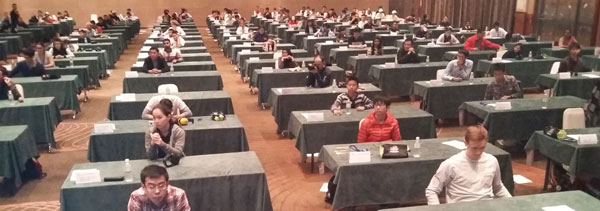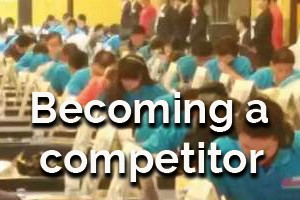The Mind Sport of Memory was jointly founded by Tony Buzan and Raymond Keene OBE in 1991 when they staged the very first World Memory Championships. They created a competition format based on ten memory disciplines which are still used today in competitions around the world.
The vision of the World Memory Sports Council is
- to put memory skills training and mental literacy skills at the heart of the education system worldwide
- to make learning mental literacy skills and memory techniques accessible to all irrespective of income, culture, circumstances, location, age, or gender
- to inspire people to take up the sport at every level by the achievements of our elite mental athletes
- to raise the profile of our memory stars and to ensure they receive the international recognition that their achievements so richly deserve
- to promote the highest levels of integrity, ethics, values and sportsmanship throughout the sport
- to attract commercial sponsorship to be able to support the educational and charitable objectives of the organisation
- to grow the sport in all continents and to eventually make it an Olympic sport.
The Mind Sport of Memory is both a fun, valuable hobby, as well as an amateur sport for all ages. At the fun end of memory, informal competitions take place in Brain Clubs and other Mind Sports groups.
These competitions take many different forms. At a competitive level, there are specific disciplines which were first created in 1991 by the founders of the sport, Tony Buzan and Raymond Keene OBE. These disciplines have evolved into a common competition framework that has enabled international competition to take place.
Ten different disciplines are conducted over 1-3 days and consist of the following events:
1. Names and Faces
2. Binary Numbers
3. Random Numbers
4. Abstract Images
5. Speed Numbers
6. Historic / Future Dates
7. Playing Cards
8. Random Words
9. Spoken Numbers
10. Speed Cards
Competitions that comply with the WMSC rules standards can be included in the World Rankings, be recognised for world records and listed in the official world memory statistics. At a World level, some disciplines like playing cards and numbers can have a one hour memorisation period and a two hour recall time. At a national level, memorisation times can be reduced to five minutes, with a ten or fifteen minute recall time to suit the level of competitors taking part. Another factor in the choice of disciplines is the preparation of competition materials. Some disciplines, like Names and Faces, Historical/Future Dates etcetera take some time to produce the memorisation and recall papers. These types of discipline require experienced Arbiters and time for marking.
Although it is not essential when organising fun memory events and competitions, an organiser would gain invaluable experience for running their own event by joining the International Guild of Mind Sports Arbiters and undertaking at leastthe Level One training.[/su_expand]
Read about the 10 Memory Disciplines used in competitions
At a competitive level, there are specific disciplines which were created in 1991 by the founders of the sport, Tony Buzan and Raymond Keene OBE, and which lay down a common competition framework that has enabled international competition to take place. It is based on the ten memory disciplines.
Competitions that comply with the WMSC rules standards can be included in the World Rankings.
At a World level, some disciplines like cards and number can have a one hour memorisation period and a two hour recall time. At a national level, memorisation times can be reduced to five minutes, with a ten or fifteen minute recall time to suit the level of competitors taking part.
Another factor in the choice of disciplines is the preparation of competition materials. Some disciplines, like Names and Faces, Binary Numbers etc take some time to produce the memorisation and recall papers. These types of discipline require experienced Arbiters and time for marking.

Although it is not essential when organising fun memory events and competitions, it is recommended that by joining the International Guild of Mind Sports Arbiters, and taking at least the Level One training, an organiser would gain invaluable experience in running their own club or event
The Mind Sport of Memory was founded in 1991 by the inventor of Mind Maps and expert on Mental Literacy, Tony Buzan and Chess Grand Master, Raymond Keene OBE. The Ten Discplines which formed the basis of the first competition are largely unchanged today and have been adopted worldwide as the basis for competitive memory competitions. There are now competitors from 30 countries participating in the sport, all competing to become the next World Memory Champion.
The sport is administered by the World Memory Sports Council which is the governing body for the sport. It compiles the World Rankings, is the custodian of the ten diciplines and ensures fair play worldwide through its Ethics Committee chaired by eight times World Memory Champion, Dominic O’Brien.
Memory is a sport in which everyone can take part. None of the top competitors would claim to be born with a great memory. All of them have learnt all the necessary techniques to develop their skills, and have practiced to a high level to get them to the top of the sport. You can do the same! Why not start today?
Memory is one of the five “Learning Mind Sports” which are Speed Reading, IQ, Creativity, Mind Mapping and Memory. All of them are competitive sports, and collectively they can help anyone to become better in their studies or in their work.

